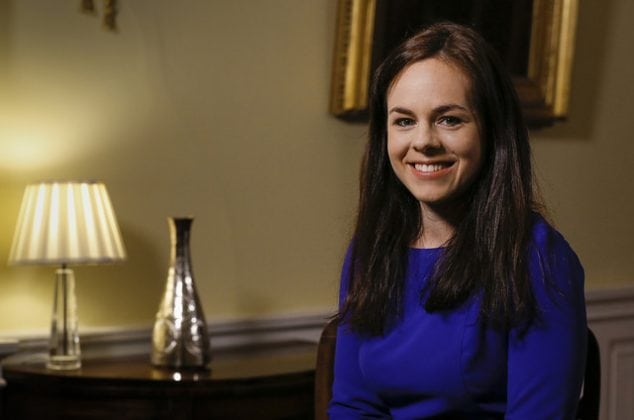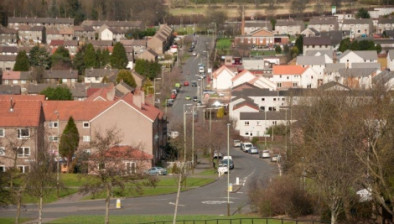Scottish Budget: Significant new investment to drive economic recovery, bolster public services and support families
Finance secretary Kate Forbes announced support for jobs and skills totalling around £1.1 billion when she presented the Scottish Budget 2021-22 yesterday.

Finance secretary Kate Forbes
In an effort to prioritise job creation, measures in the Budget included a commitment to launch a new Green Workforce Academy to help people secure work in the low carbon economy, a £100 million Green Jobs Fund over the next parliament, £7m towards making Scotland a world class hub for digital business and an additional £115m for the Young Person’s Guarantee.
Health receives record funding of over £16bn, an increase of 5.3% on 2020-21, along with a further £869m to continue tackling coronavirus, including funding for the vaccination and test and trace programmes. This means that, over the course of this parliament, investment in health has increased by £1.8bn in real terms - more than tripling the commitment to increase health funding by £500m more than inflation.
To support family budgets, £90m is being made available for local authorities to freeze council tax.
Public sector workers earning up to £25,000 can receive at least a 3% pay increase via a £750 cash underpin, while there is a 1% rise for those earning above that amount, capped at £800 above £80,000.
The Budget also proposes:
- £11.6bn for local government, which represents a £335.6m increase in core revenue funding, including the £90m to compensate local authorities which choose to freeze Council Tax, plus £259m in one-off funding
- £1.9bn for primary health care to help deliver more services in the community. A further £550m is earmarked to build new Elective Care Centres and the Baird Family Hospital and Anchor Centre in Aberdeen
- £98.2m to improve Scotland’s digital infrastructure and deliver access to high quality broadband and mobile coverage.
- £711.6m for affordable housing and £68m for the first full year of the Scottish Child Payment, tackling child poverty
- a new £55m programme to support town centres and community-led regeneration projects
- more than £3.1bn in resource and capital investment for education and skills, and £567m to provide 1,140 hours of early learning and childcare, supporting implementation of the UK’s most ambitious childcare programme
- £1.3bn for the Scottish Police Authority, including a £60m increase in Police Scotland’s revenue budget – exceeding an earlier pledge of a £100m boost over five years
- £1.6bn for rail and bus services and £100.5m for active travel to consolidate changes to healthy, green travel options seen during the pandemic
- doubling the Rural Tourism Infrastructure Fund, helping tourist attractions and local communities make improvements to cope with increased visitors
- an additional £27m to expand woodland creation and the associated infrastructure, supporting green jobs.
The finance secretary confirmed that the Local Authority Discretionary Fund will be doubled to £60m in this financial year to allow councils to respond to local needs. In addition, businesses eligible for the Strategic Framework Business Fund will receive full Level 4 payments on 22 February, regardless of any future changes to local restrictions.
The Scottish Government will also increase a scheme which compensates councils for the loss of income from sales, fees and charges due to the pandemic from £90m to £200m in 2020-21.
Ms Forbes said: “This budget is being delivered in exceptional circumstances as we continue to battle a pandemic that has shaken our society and economy to the core, and as we face the harmful impacts of Brexit.
“It promotes innovation and reform, new beginnings, new directions. And while it continues to target support in the immediate term, it also tracks a course over the next year to build a fairer, stronger and greener country.
“To help drive our green economic recovery I am providing the stability and certainty that businesses have asked for through the most competitive reliefs packages in the UK. There are innovative measures to promote sustainable growth and we are investing more than £1bn in jobs and training.
“The budget sets out a distinctive Scottish pay policy that again supports the lowest paid, charting a different course to the ill-judged pay freeze announced by the UK Government. It also bolsters our health service, delivers more affordable homes, provides additional childcare places and helps young people into work.
“Throughout these dark times we have never given up hope. This budget seeks to build on that hope and, by focusing on how we rebuild and renew our country, make the light at the end of the tunnel shine that bit brighter.”
Think tank IPPR Scotland has called for greater support for low-income families.
Russell Gunson, director of IPPR Scotland, said that while the Budget focusses on the public health and economic crisis before us, it could do more to respond to the social crisis we will clearly face for years to come.
Mr Gunson said: “It’s good to see plans to protect public sector pay, deliver the long-anticipated Scottish Child Payment and create much-needed employment opportunities for young people through the Scottish Youth Guarantee - all things IPPR Scotland has called for.
“However, the decision to end the freeze on the higher-rate tax threshold could sacrifice tens of millions of pounds of much-needed tax revenue. This has to be questioned, especially when more investment will be needed to help the poorest families in Scotland through the crisis and the recovery, next year and beyond.”
Rachel Statham, senior research fellow at IPPR Scotland, added: “The vast pressure on Scotland’s finances due to the Covid-19 crisis cannot be overstated. Against that backdrop, planning spending for next year would be a difficult task for any finance secretary but without full visibility of the UK government’s spending plans it is close to impossible.
“While the Scottish Government’s commitment to protecting public sector pay, and its emphasis on low workers, is welcome, families across Scotland will be looking ahead with trepidation. The introduction of the Scottish Child Payment next month is welcome, but its value and roll-out was devised in a pre-Covid world. Further action will now be needed to get quicker support to keep families afloat.
“As we look towards Scotland’s recovery, we must consider how to deliver a Scotland that is fairer and stronger than before. Those who have been best protected during the crisis must be asked to contribute more, and those whose hard work helped us get through it need to be recognised in more than just words.
“We have done the right thing by businesses through the crisis, to the tune of billions of pounds in support, and now we must ask them to do the right thing in return, through greater progress on fair work, inclusive growth and embedding a wellbeing economy through Scotland’s recovery.
“We hope to see stronger commitments in this budget before it’s finalised over the coming weeks.”









